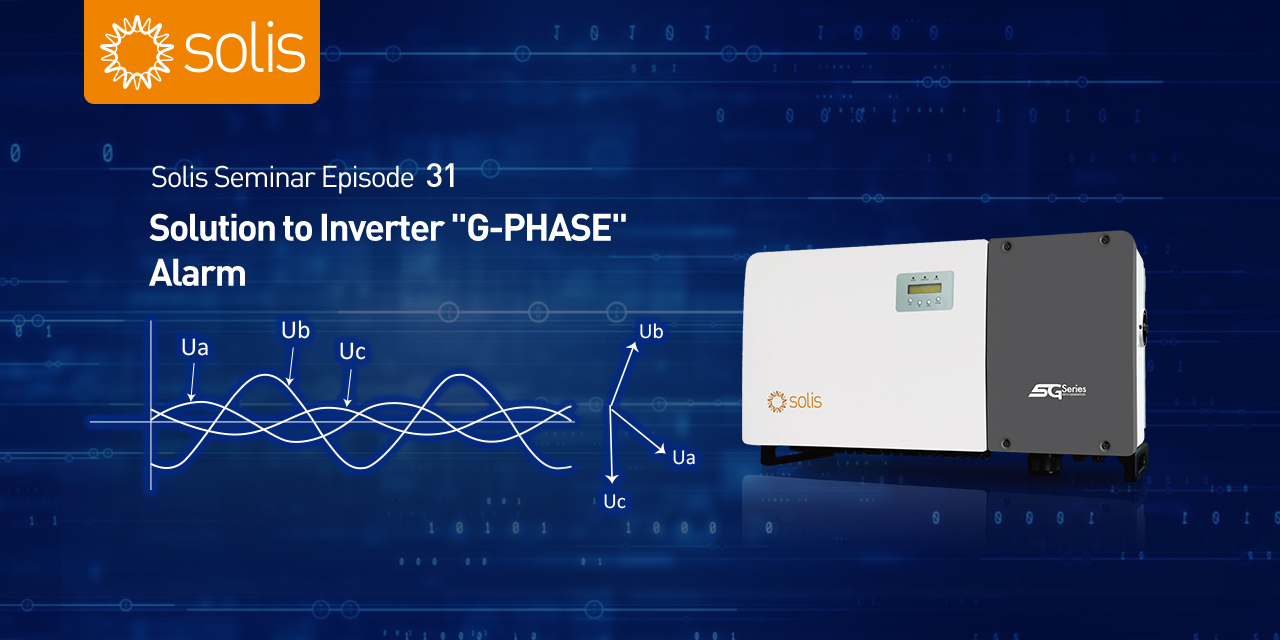
Background
In PV systems, there can be errors caused by problems on the grid side. As an important operating function of a solar PV system and the grid, inverters are very sensitive to grid problems and will respond quickly. Among them, grid imbalance faults, although rare, can easily affect inverters, PV systems and sometimes even loads.
In this Solis seminar, we will share information on “grid unbalanced” or G-PHASE errors that appear in PV systems and their solutions.
Fault Description
On start-up, Soils inverter will detect the status of the grid. If the grid phase is unbalanced, the inverter will disconnect itself from the grid and display the “G_PHASE” error.

Causes of “G-PHASE” Errors
1. Voltage imbalance on the grid side: Grid unbalanced is an important issue that causes this alarm for the inverter because the inverter will monitor the grid voltage in real time. When the three-phase waveform of the grid is abnormal, the inverter will immediately give feedback and disconnect from the grid.

Figure 1. Waveform diagram when the power grid is unbalanced
- Large-scale equipment is in use, which has an impact on the grid and causes the grid to be unstable: For PV systems installed in industrial areas, inverters are more prone to alarms from the grid, such as grid overvoltage, grid unbalanced, and grid imbalance. These are all because the operation of large current equipment will affect the operation of the inverter through the grid.

Figure 2. The grid problems caused by various load shocks
Solution:Use an oscilloscope to check whether the three-phase voltage and waveform of the grid are normal. If not, record the waveform and report it to your local Solis technical team for technical support.
Possible Inverter Related Causes:
1. The AC cable is incorrectly connected: During the installation process, errors can be caused by cables being incorrectly connected which causes phase unbalanced in the power injection process.

Figure 3. Wire sequence connection error
Solution: Reconnect the AC cable and make sure that the wiring sequence is correct.
2. The AC wire used in the PV system is unsuitable: If an unsuitable cable is selected during the design process, such as inferior AC cable made from low grade material or with a small diameter this can cause problems. The system will be in contact with the metal of the cable due to the current heating effect during long-term operation of the system. The film is deformed and blackened, and the impedance is significantly different, which will cause the three-phase voltage to appear unbalanced and cause the inverter to alarm.

Solution:For correct selection of cables and specifications, please refer to the manual provided with your Solis inverter, which contains detailed cable recommendations.
3. The AC terminal of the inverter is in poor contact: If there is a problem with the AC terminal of the inverter, such as loose lead wire, poor lead contact, etc., this alarm will also appear. Our suggestion is to replace the AC terminal of the inverter. Your local Solis service team can provide support and advice on this.
Summary
G_PHSAE error is an uncommon type of problem, but it will still cause system shutdown and affect power generation. So, when this fault occurs in a solar PV system, it needs to be rectified in time to minimize system downtime. Follow the solutions provided and, if needed, utilize the support of your local Solis support team to restore the system to normal operating conditions.
If you have any other questions, you can contact Solis support engineers or go to www.solisinverters.com/aftersales.html
Solis is one of the world’s largest and most experienced string inverter manufacturers with a global network of service teams.
